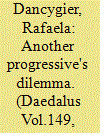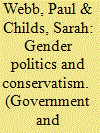| Srl | Item |
| 1 |
ID:
171110


|
|
|
|
|
| Summary/Abstract |
Immigration and the diversity it brings have led to the emergence of the “progressive's dilemma” whereby open societies that take in immigrant outsiders may find it difficult to maintain the solidarity required to sustain the welfare state. In this essay, I address another progressive's dilemma: Focusing on the case of Western Europe, I argue that when open borders give rise to radical-right parties, immigration can inadvertently also endanger progressive achievements in gender equality. Though xenophobic policies frequently constitute their core message and the primary source of their appeal, radical-right parties are also defenders of traditional family values and outspoken critics of measures that promote the economic and political advancement of women. Moreover, the composition of these parties, both in terms of voters and politicians, is disproportionately male. As a result, when radical-right, anti-immigrant parties enter national parliaments, the descriptive and substantive representation of women suffers, sometimes reversing long-held gains in gender equality.
|
|
|
|
|
|
|
|
|
|
|
|
|
|
|
|
| 2 |
ID:
111677


|
|
|
|
|
| Publication |
2012.
|
| Summary/Abstract |
Can conservatives be feminists? This article examines the issue by exploring the case of the British Conservative Party, drawing on a new survey of party members. Under David Cameron's leadership, reforms have been made to the party's parliamentary selection procedures and distinct women's policies developed, thus addressing both the descriptive and substantive representation of women. We examine party members' attitudes towards three types of gender issue: basic orientations towards gender roles and relations; specific policy measures relevant to the substantive representation of women; and the descriptive representation of women. Detailed empirical analysis reveals that there is significant support for progressive liberal feminist positions on each of these dimensions in the party, and that sex, age and basic ideological dispositions drive such attitudes to varying degrees. Even so, support for a liberal feminist position on the descriptive representation of women - that is, the aspect of gender politics where the leadership has been most active - remains on the whole quite limited.
|
|
|
|
|
|
|
|
|
|
|
|
|
|
|
|